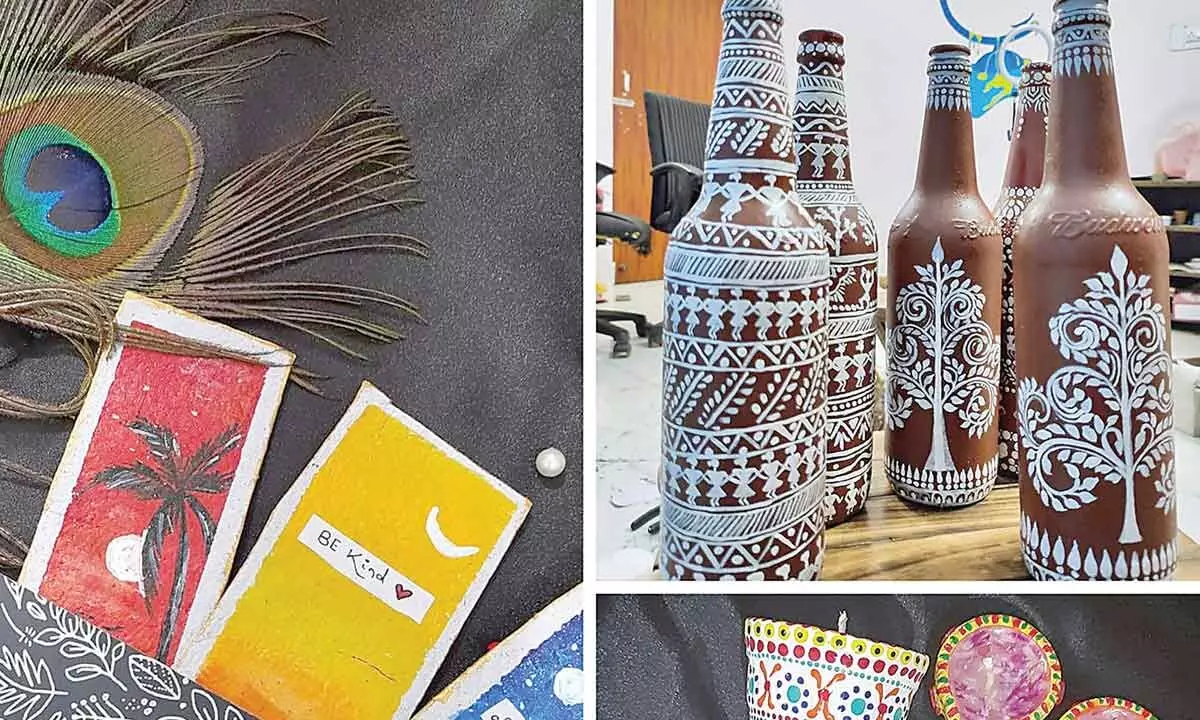Live
- All you need to know about PAN 2.0
- Akasa Air redefines travel experience with industry-first offerings
- MP: Residents stage protests against liquor shop in Indore
- Telugu Actor Shri Tej Booked for Alleged Cheating and False Promise of Marriage in Live-in Relationship
- Toyota Kirloskar Motor Celebrates 1 Lakh Urban Cruiser Hyryder on Indian Road
- MLS: New York City FC part ways with head coach Nick Cushing
- Delhi CM says Centre cutting AAP voters’ names from rolls, BJP hits back
- Hyderabad Metro Rail Phase-II Works to Begin in Old City in January 2025
- Odisha: 668 persons killed in human-elephant conflicts in last three years
- DEFENDER JOURNEYS: TO EMBARK ON ITS THIRD EDITION FROM NOVEMBER 2024
Just In
How small-town India is leading the charge in upcycling


A recent report by Fashion for Good and NGO Canopy Planet estimates that India accounts for 8% of global clothing and textile waste.
A recent report by Fashion for Good and NGO Canopy Planet estimates that India accounts for 8% of global clothing and textile waste. Do we then need a macro strategy to ensure that this waste does not end up in landfills or can we also dwell upon the micro management of the problem by striving to make consumption patterns more sustainable?
Come to think of it, there is much to be said about the transformative power of small-town upcycling initiatives and their relevance in addressing regional environmental challenges while contributing to broader sustainability goals. For us sustainability may be a practice but for certain demographics, it is a way of life. For instance, I grew up in a milieu where nothing ever went to waste. Vegetable peels and kitchen waste were either composted, fed to the cattle or used as humus to nourish the plants in the garden. The water after washing rice was also fed to the cows while old clothes were repurposed as mops or dusters.
Mainstreaming the idea of upcycling
It is heartening that today systematic upcycling initiatives are growing in small-town India. A focus on cultural preservation, government support, dissemination of education and awareness have also done their bit to sensitise people to the value of upcycling. Non-profit organisations and change makers are conducting workshops to mainstream the idea of waste management, along with sustainable living practices and their benefits. Various government initiatives, policies, subsidies, and awareness campaigns at the local level are further helping to promote waste management. Further, upcycling initiatives and green businesses can significantly boost employment in small towns, fostering local economic development and poverty reduction. These practices also curb greenhouse gas emissions associated with the production, transportation, and disposal of goods, aligning with national climate change mitigation efforts.
For me personally, the idea of thinking ‘Beyond Waste’ germinated very early as I was very attracted to art and craft. I was also interested in the idea of sustainability very naturally as I grew up in a house where it was practised every day. These factors led me to look at the gifting industry and just how unsustainable it was. When I decided to do something about it, ‘Beyond Waste’ came into being.
Rethinking sustainability beyond challenges
There is a common notion that sustainability is expensive, especially when you make choices about the food you eat. These ideas can be dispelled with information but there are other challenges which need to be addressed as well. To reach a broader demographic and empower citizens in rural areas and small towns, there’s also a need for organising more upskilling programs. These programs should focus on imparting technical expertise, covering aspects like design, manufacturing, and product development crucial for effective upcycling.
Small-town upcycling initiatives may start at the grassroots level but they have the potential to be scaled up and replicated in not just other regions of India but also globally. So, documenting their best practices, sharing the lessons derived from them and providing support and guidance to aspiring upcycling entrepreneurs can facilitate the expansion and replication very successfully. This will also help us tackle climate change and tackle the burgeoning waste problem, in a more proactive manner.
(Lipsa Behura is the founder of Beyond Waste & part of an initiative titled #GreenHustlers, focused on fostering a more inclusive and dynamic climate startup ecosystem in India.)

© 2024 Hyderabad Media House Limited/The Hans India. All rights reserved. Powered by hocalwire.com






